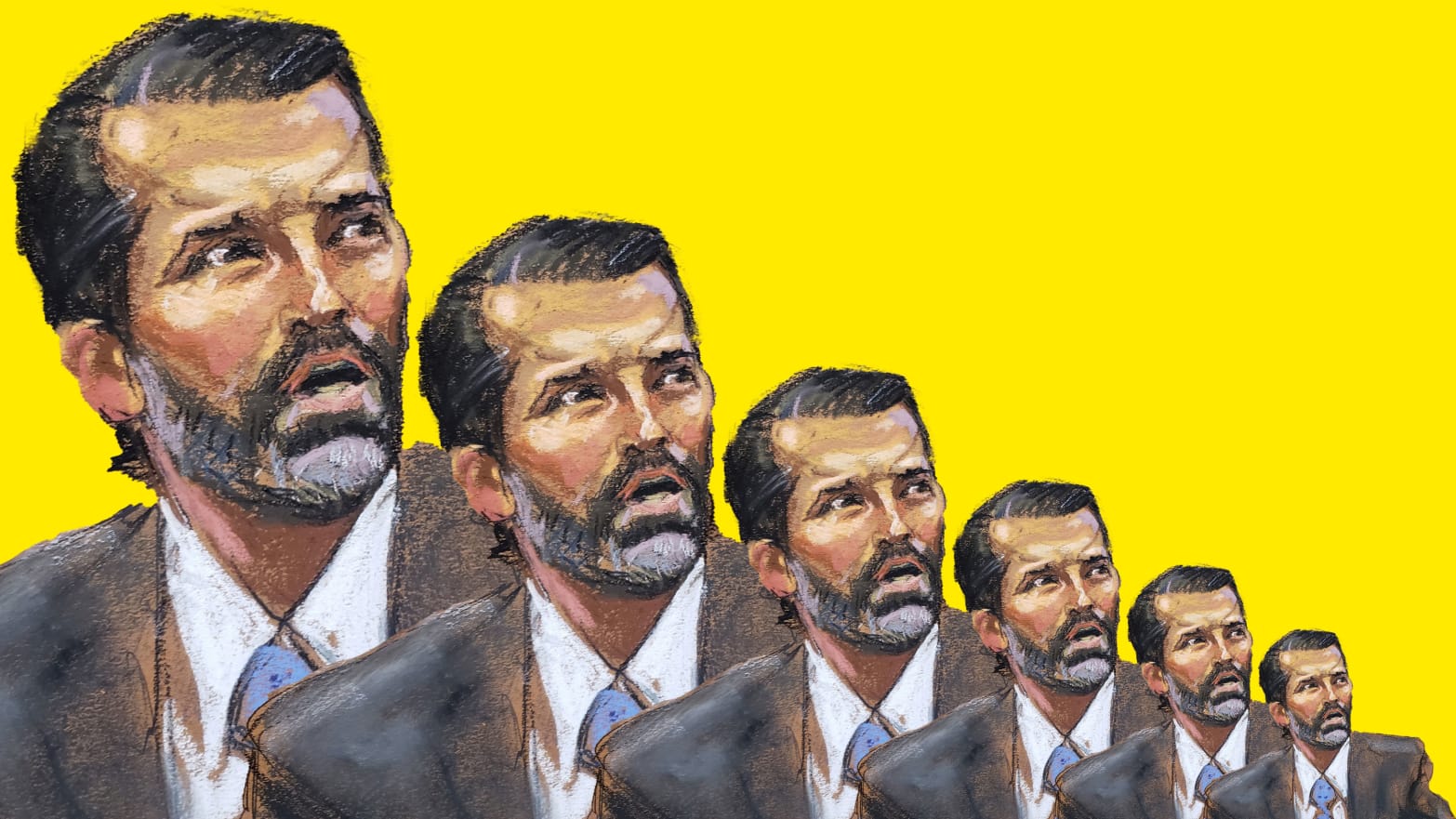The Trump family launched their much-awaited defense at their bank fraud trial in New York on Monday with an hours-long sales presentation about their properties worldwide—a maundering display that even the judge derided as “irrelevant.”
Donald Trump Jr. spent most of the day gloating about his dad’s “genius,” at one point eliciting eye rolls when he referred to the former American president as “an artist with real estate” who paints on a “blank canvas” by developing skyscrapers on otherwise crappy land.
“He sees the things that other people don’t. He creates the things other people don’t envision,” he testified while fielding softball questions from his lawyer, dodging any mention of the glaring chicanery in the family company’s finances.
Halfway through a bank fraud trial that threatens to rip the Trump Organization out of the family’s grasp and pound them with $250 million or more in fines, New York Attorney General Letitia James’ investigators have spent six weeks documenting how the billionaire patriarch faked his personal financial statements to unfairly score bank loans—and how top executives, including two of his sons, went along with the lies.
Former President Donald Trump, who has attended much of the trial, wasn’t in the courtroom Monday. Instead, Don Jr. waxed on about his childhood, slowly and deliberately constructing an image of a hard-working immigrant family—an indirect defense that appeared to try humanizing a billion-dollar real estate empire that might get pulverized by the judge at the end of this case come December.
Instead, it came off as a brief suspension of reality.
He started the morning’s testimony by asserting that the Trump Organization was indisputably a “meritocracy” where “fancy college degrees” don’t matter and employees are only elevated and rewarded based on “who could get something done.” Don Jr. conveniently glossed over the fact that the company’s leadership is made up of the tycoon’s adult kids—one of whom eventually quit the firm to join the Trump White House under the official title “first daughter and advisor to the president."
On the stand, Don Jr. boasted about his father’s ability to revamp old properties, describing the romanesque Old Post Office in downtown Washington—which is just a few blocks from the White House—as “a war zone” that badly needed revamping. He credited his dad with single-handedly transforming the area near the United Nations headquarters in New York City into “a market for a sexy condominium.”
At one point, he even claimed that the billionaire real estate tycoon radically transformed the luxury of condo living by doing such novel things as installing workout equipment on-site.
“He created things that now are commonplace in every luxury development around the world, but 20 years ago, when I started, doing those things was unheard of. You wouldn’t put a gym in a building,” he said. “He was really a visionary when it came to those things.”
Don Jr. spoke at length about the dozens of properties in the family’s massive portfolio, gushing about his father’s prowess while lawyers flipped through catalog photos of lavish lobbies, sunny golf courses, and sunlit apartments. At one point, an attorney on the AG’s team, complained about the Trump defense team’s evidence on display.
“This is a draft marketing brochure," Andrew Amer remarked.
But Don Jr.’s non sequitur narrative kept returning to the idea that the Trumps built an empire that they’re proud of—an oblique counter to the AG’s insistence that the business was built on an ongoing fraud.
His testimony was a notable departure from the combative performance he put on while being examined by the AG’s lawyers earlier this month, when he was on the defensive and blamed any financial irregularities on accountants.
According to New York state investigators, Don Jr. was an instrumental part of the alleged “persistent fraud” that led the AG to sue the Trumps last year. Her lawsuit noted that Trump Organization paperwork tripled the size of the real estate mogul’s Trump Tower triplex, double-counted a grocer’s tenant income at the gothic 40 Wall Street skyscraper, and inflated the value of a forested estate north of Manhattan before donating some of the land for conservation purposes.
James is asking Justice Arthur F. Engoron to prohibit Don Jr. and other top executives from leading companies in New York for the foreseeable future.
However, the tale Don Jr. weaved in court took on a different shine when contrasted with what has been happening in recent days outside of this New York courthouse.
Don Jr.—who frequently rails against immigrants and has compared them to zoo animals—praised the “Horatio Alger story” of his great-grandfather Friedrich Trump for leaving Bavaria in 1885 to brave the American Wild West and Yukon. (He never mentioned that his ancestor actually fled German imperial military service and was banished there.)
But his celebration of American immigrant ingenuity comes after journalists at Rolling Stone and The New York Times have detailed his father’s hope to take back the White House and employ firing squads and executions, as well as build massive camps and force mass deportations. As Don Jr. spoke on the witness stand, the Hispanic civil rights organization LULAC put out a statement condemning his father's 2024 campaign, citing “his vitriolic hate-filled speeches [that] only inflame the deepest, most deranged hatred against immigrant Latinos and people of color.”
Meanwhile, Don Jr.’s description of his family’s successful endeavors in Hawaii—where they struck a deal to have a Trump-branded hotel on the south shore of Honolulu—fell flat when the AG’s team eventually got to ask him questions on cross-examination. The Trump family scion seemed annoyed when Assistant Attorney General Colleen Faherty pointed out that, just days ago, the owner of the Trump International Hotel Waikiki decided to ditch the Trump brand name and go with Hilton instead.
“If they want to pay millions of dollars, I'm OK with it,” Don Jr. shot back.

